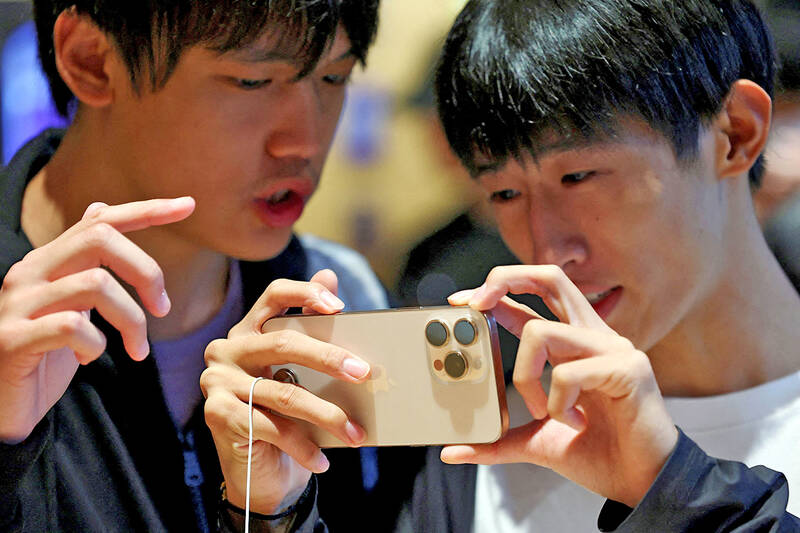Apple Inc is offering rare discounts of up to 500 yuan (US$68.50) on its latest iPhone models in China, as the US tech giant moves to defend its market share against rising competition from domestic rivals like Huawei Technologies Co (華為).
The four-day promotion, running from Saturday to Tuesday next week, applies to several iPhone models when purchased using specific payment methods, according to its Web site.
The flagship iPhone 16 Pro with a starting price of 7,999 yuan and the iPhone 16 Pro Max with a starting price of 9,999 yuan would see the highest discount of 500 yuan. The iPhone 16 and iPhone 16 Plus would receive a 400 yuan reduction.

Photo: Reuters
The discounts come as consumers remain cautious with spending amid China’s slowing economy and deflationary pressures, with the country’s consumer inflation hitting a five-month low in November last year.
Apple is grappling with a declining market share in China, the world’s largest smartphone market, where local manufacturers have intensified competition.
Huawei has emerged as a particularly strong challenger since its return to the premium segment in August 2023 with locally made chipsets.
Huawei had cut the prices of a variety of high-end devices, including mobile phones, by up to 3,000 yuan over the weekend on one of China’s leading e-commerce platforms.
Apple briefly fell out of China’s top five smartphone vendors in the second quarter of last year before recovering in the third quarter.
The US company’s smartphone sales in China still slipped 0.3 percent during the third quarter from a year earlier, while Huawei’s sales surged 42 percent, according to research firm International Data Corp.
The Apple promotion also includes discounts of 200 yuan to 300 yuan on older iPhone models, as well as other categories of products such as MacBook laptops and iPad tablets.
Customers must use designated payment methods including WeChat Pay (微信支付) or Alipay (支付寶) to qualify for the discounts.

In Italy’s storied gold-making hubs, jewelers are reworking their designs to trim gold content as they race to blunt the effect of record prices and appeal to shoppers watching their budgets. Gold prices hit a record high on Thursday, surging near US$5,600 an ounce, more than double a year ago as geopolitical concerns and jitters over trade pushed investors toward the safe-haven asset. The rally is putting undue pressure on small artisans as they face mounting demands from customers, including international brands, to produce cheaper items, from signature pieces to wedding rings, according to interviews with four independent jewelers in Italy’s main

Macronix International Co (旺宏), the world’s biggest NOR flash memory supplier, yesterday said it would spend NT$22 billion (US$699.1 million) on capacity expansion this year to increase its production of mid-to-low-density memory chips as the world’s major memorychip suppliers are phasing out the market. The company said its planned capital expenditures are about 11 times higher than the NT$1.8 billion it spent on new facilities and equipment last year. A majority of this year’s outlay would be allocated to step up capacity of multi-level cell (MLC) NAND flash memory chips, which are used in embedded multimedia cards (eMMC), a managed

In the wake of strong global demand for AI applications, Taiwan’s export-oriented economy accelerated with the composite index of economic indicators flashing the first “red” light in December for one year, indicating the economy is in booming mode, the National Development Council (NDC) said yesterday. Moreover, the index of leading indicators, which gauges the potential state of the economy over the next six months, also moved higher in December amid growing optimism over the outlook, the NDC said. In December, the index of economic indicators rose one point from a month earlier to 38, at the lower end of the “red” light.

The global server market is expected to grow 12.8 percent annually this year, with artificial intelligence (AI) servers projected to account for 16.5 percent, driven by continued investment in AI infrastructure by major cloud service providers (CSPs), market researcher TrendForce Corp (集邦科技) said yesterday. Global AI server shipments this year are expected to increase 28 percent year-on-year to more than 2.7 million units, driven by sustained demand from CSPs and government sovereign cloud projects, TrendForce analyst Frank Kung (龔明德) told the Taipei Times. Demand for GPU-based AI servers, including Nvidia Corp’s GB and Vera Rubin rack systems, is expected to remain high,